Martin Edwards's Blog, page 149
January 11, 2017
The Crime Writers' Association

The Crime Writers' Association has a new Chair. I can tell you this authoritatively, because it happens to be me. Len Tyler, who has piloted the CWA with aplomb for more than eighteen months, has stepped down early, because of the scale of the workload of the Chair's role. So I've taken his place. And the first thing I'd like to say is what a pleasure it's been working alongside Len as his Vice Chair. I wish him all the best with his writing projects, and very much hope he'll become involved again with the CWA at a future date once he's met a few killer deadlines.
As it happens, this year sees the thirtieth anniversary of my joining the CWA (I was only a lad at the time, you understand....) Shortly after I joined I was contacted by Peter N. Walker, and invited to the inaugural meeting of the CWA's northern chapter. That was a great occasion, if thinly attended. Reginald Hill, who was there with his wife Pat, dubbed us "the Few". That day I met Peter for the first time - long before he became famous as the guy who created Heartbeat. As well as Reg, I met another future CWA Diamond Dagger winner, Bob Barnard, and his wife Louise. Plus Peter Lewis, biographer of Eric Ambler, and his wife Margaret Lewis, biographer of Ngaio Marsh. What I remember vividly is how kind they were to a young chap from Cheshire they knew nothing about. We all became friends, and my admiration for them all will never falter. That experience also makes me feel strongly that looking after newcomers to membership is so important, just as is making sure that long-standing members continue to feel valued.
Before long I started going to CWA annual conferences, where I met many delightful people. Some are still around, some are not. All of them, pretty much without exception, were great fun to be with. Youngish writers by the name of Val McDermid, Ann Cleeves, and Margaret Murphy among others joined the northern chapter and I enjoyed their company as well as their books. Margaret formed Murder Squad in 2000, and this collective of writers is still going strong.
I am not by nature a very sociable person. Like many writers, I'm content with my own company and I often prefer it to the alternative. But I've found the company of my fellow crime writers truly life-enhancing over the years. The CWA is a terrific organisation and it's very significant that it has grown to a point where it's now bigger than at any time in its history of over sixty years. Its Daggers (their trademarked logo heads this post) are world famous. This is quite something in an era where membership organisations generally tend to be in substantial decline.
Of course, I am proud to have been picked to lead the CWA. And I'm startled to find that I'm the only person to have been both Chair of the CWA and President of the Detection Club at the same time. Inevitably I'll make a few mistakes as I try to move things forward, but I plan to do my best to make sure both organisations look after their members, and continue to play a significant part in the crime writing world, here in the UK and further afield.
Published on January 11, 2017 06:59
January 9, 2017
Alibis in the Archives
 I'm delighted to announce an event that I think will be of great interest to crime fans, whether their tastes lie in classic or contemporary crime writing. Even better if you enjoy both! The event is called Alibis in the Archives, and it will be held at Gladstone's Library from 9-11 June. The library is in Hawarden, Flintshire, but for anyone unfamiliar with that corner of North Wales, it's only a short distance - a bus-ride of twenty minutes - from Chester and it's close to the motorway network.
I'm delighted to announce an event that I think will be of great interest to crime fans, whether their tastes lie in classic or contemporary crime writing. Even better if you enjoy both! The event is called Alibis in the Archives, and it will be held at Gladstone's Library from 9-11 June. The library is in Hawarden, Flintshire, but for anyone unfamiliar with that corner of North Wales, it's only a short distance - a bus-ride of twenty minutes - from Chester and it's close to the motorway network.The event will celebrate the launching of the Crime Writing Archive at Gladstone's Library. This takes the form of two separate but distinct archives, for the Crime Writers' Association and for the Detection Club respectively. The former archive is much more substantial than the latter at present, but I do see this as a landmark moment in the history of crime fiction heritage. Donations of relevant materials to the archive are, of course, warmly welcomed, and the process of developing the archives and cataloguing them is ongoing.
The venue is, to my mind, ideal. Regular readers of this blog will know that I've enthused about Gladstone's Library several times over the years. It has a great history, as well as a terrific collection of books and other materials, and it also has a wonderfully atmospheric ambience. A unique feature is that it's residential - so you can stay there, in one of the pleasant rooms, and also enjoy the very good food. (Though I should add that accommodation is inevitably limited - a good local hotel will also be utilised for this weekend.)
So what will be happening over the weekend? Plans are afoot to make it not only be interesting but also a bit different. So there will be at least one interactive murder mystery evening, plus talks from a range of writers, including Ann Cleeves, who will be discussing Vera and Shetland among other topics. I'm really looking forward to it, and if you would like to book, the Library's expertise in event management is such that I'm confident you won't be disappointed.
Published on January 09, 2017 05:14
January 6, 2017
Forgotten Book - Which Way Came Death?
Which Way Came Death? written by Faith Wolseley, and published by John Murray in 1936, is my Forgotten Book for today, and it really is forgotten. I'd be very surprised if more than one or two of my readers have come across it. And yet it was, in its day, a very well regarded and well reviewed novel. With some justice, I should say, as the writing is elegant and often witty.
The book is presented as a first novel, yet although it was the first under the Wolseley name, it was not really a debut, for the author had previously dipped a toe into the waters of detection with two books under what was, I understand, her real name, Stella Tower. Dumb Vengeance, which really was her first novel, was one of my Forgotten Books recently.
The Tower book was set in a country house. The Wolseley novel is set against another background that was popular in Golden Age detective fiction: the public school. Anthony Berkeley, James Hilton, Nicholas Blake, Christopher Bush and Gladys Mitchell were among those who made good use of school setting in the Thirties, but the wit and insight into school life in this book calls to mind R.C. Woodthorpe's The Public School Murder. Wolseley's writing did not have the political edge of Woodthorpe's, but is none the worse for that.
It becomes clear early on that a schoolmaster called Stoner is the likely murder victim, and we are led to believe that poison may be the murder weapon - but how will it be administered? The head teacher's wife is a memorable character who plays a central role in the story, and I was not surprised to discover that the author was herself the wife of a public school teacher. The story flags a bit in the middle, as in Dumb Vengeance, before perking up again. The plot is nothing special, but the quality of the writing lifts this one out of the ordinary.
The book is presented as a first novel, yet although it was the first under the Wolseley name, it was not really a debut, for the author had previously dipped a toe into the waters of detection with two books under what was, I understand, her real name, Stella Tower. Dumb Vengeance, which really was her first novel, was one of my Forgotten Books recently.
The Tower book was set in a country house. The Wolseley novel is set against another background that was popular in Golden Age detective fiction: the public school. Anthony Berkeley, James Hilton, Nicholas Blake, Christopher Bush and Gladys Mitchell were among those who made good use of school setting in the Thirties, but the wit and insight into school life in this book calls to mind R.C. Woodthorpe's The Public School Murder. Wolseley's writing did not have the political edge of Woodthorpe's, but is none the worse for that.
It becomes clear early on that a schoolmaster called Stoner is the likely murder victim, and we are led to believe that poison may be the murder weapon - but how will it be administered? The head teacher's wife is a memorable character who plays a central role in the story, and I was not surprised to discover that the author was herself the wife of a public school teacher. The story flags a bit in the middle, as in Dumb Vengeance, before perking up again. The plot is nothing special, but the quality of the writing lifts this one out of the ordinary.
Published on January 06, 2017 03:04
January 5, 2017
Unforgotten - series 2 - ITV review
[image error]
I'll be featuring a Forgotten Book tomorrow as usual. But first - it's Unforgotten time! Yes, the ITV drama that keep millions engrossed just over a year ago is back with a new cold case mystery. It aired this evening, and the first episode suggests that the key elements of the narrative structure will resemble those which worked so well the first time around.
This means a return for the detective duo played by Nicola Walker and Sanjeev Bhaskar, who make a very good combination. There is contrast between their characters and lives, but their relationship is not as edgy as that of so many cop pairings, and that's something I find rather refreshing.
Workmen engaged on dredging a river discover a suitcase, and when they open it up, they find inside the remains of a body. There's no obvious clue to the person's identity, but two significant items are found: a man' s watch, and a pager. Having establish that the deceased was stabbed, the first question for the police is: who was he? I'm hoping there's a very plausible reason why the killer left the watch and pager in the suitcase.
It turns out that the crime dates back just over a quarter of a century. We're introduced to a number of suspects, including a barrister who, despite his apparent urbanity, reacts furiously to provocation. A clue? Or is it too obvious? There's a teacher in the mix, and also a nurse. And what of the dead man's wife - who is herself a cop? Chris Lang's script kept me engrossed, and I'll definitely be watching this one take its course..
I'll be featuring a Forgotten Book tomorrow as usual. But first - it's Unforgotten time! Yes, the ITV drama that keep millions engrossed just over a year ago is back with a new cold case mystery. It aired this evening, and the first episode suggests that the key elements of the narrative structure will resemble those which worked so well the first time around.
This means a return for the detective duo played by Nicola Walker and Sanjeev Bhaskar, who make a very good combination. There is contrast between their characters and lives, but their relationship is not as edgy as that of so many cop pairings, and that's something I find rather refreshing.
Workmen engaged on dredging a river discover a suitcase, and when they open it up, they find inside the remains of a body. There's no obvious clue to the person's identity, but two significant items are found: a man' s watch, and a pager. Having establish that the deceased was stabbed, the first question for the police is: who was he? I'm hoping there's a very plausible reason why the killer left the watch and pager in the suitcase.
It turns out that the crime dates back just over a quarter of a century. We're introduced to a number of suspects, including a barrister who, despite his apparent urbanity, reacts furiously to provocation. A clue? Or is it too obvious? There's a teacher in the mix, and also a nurse. And what of the dead man's wife - who is herself a cop? Chris Lang's script kept me engrossed, and I'll definitely be watching this one take its course..
Published on January 05, 2017 14:50
January 4, 2017
The Narrowing Circle - 1955 film review
I first read Julian Symons' novel The Narrowing Circle when I was a teenager, but until recently I was unaware that in 1955 it was filmed. The screenplay was written by Doreen Montgomery, a very experienced writer for film and television, who is said to have created the character of Emma Peel for The Avengers.
The novel is a good example of post-war psychological suspense fiction. Symons was one of the British pioneers in this field, although his fiction is much less well-known than that of Patricia Highsmith,the legendary American writer, whose work he much admired. The story charts the battle of wits and wills between writer Paul Nelson and the relentless Inspector Crambo.
The film is more conventional, and in terms of both plot and style, it owes almost as much to that Cornwell Woolrich classic Phantom Lady as it does to Symons' novel. A colleague of Nelson's wins promotion at Nelson's expense, and for good measure nicks Nelson's girlfriend. When he is found dead in Nelson's apartment, Nelson relies on an alibi. He'd gone off to drown his sorrrows, picked up a prostitute, and spent the night in a seedy hotel. But when Crambo checks the alibi, the chap at the hotel denies all knowledge of Nelson, and the girl cannot be found.
The story is told with some pace, which compensates for the flimsiness of one or two of the plot twists. I don't know what Symons made of it, though I suspect he wouldn't have been thrilled by its lack of subtlety. But it's a perfectly watchable British B movie, with Paul Carpenter as Nelson and Hazel Court as a woman who falls for him and then helps solve the mystery, with such stalwarts as Basil Dignam, Russell Napier and Ronnie Stevens in the cast.
The novel is a good example of post-war psychological suspense fiction. Symons was one of the British pioneers in this field, although his fiction is much less well-known than that of Patricia Highsmith,the legendary American writer, whose work he much admired. The story charts the battle of wits and wills between writer Paul Nelson and the relentless Inspector Crambo.
The film is more conventional, and in terms of both plot and style, it owes almost as much to that Cornwell Woolrich classic Phantom Lady as it does to Symons' novel. A colleague of Nelson's wins promotion at Nelson's expense, and for good measure nicks Nelson's girlfriend. When he is found dead in Nelson's apartment, Nelson relies on an alibi. He'd gone off to drown his sorrrows, picked up a prostitute, and spent the night in a seedy hotel. But when Crambo checks the alibi, the chap at the hotel denies all knowledge of Nelson, and the girl cannot be found.
The story is told with some pace, which compensates for the flimsiness of one or two of the plot twists. I don't know what Symons made of it, though I suspect he wouldn't have been thrilled by its lack of subtlety. But it's a perfectly watchable British B movie, with Paul Carpenter as Nelson and Hazel Court as a woman who falls for him and then helps solve the mystery, with such stalwarts as Basil Dignam, Russell Napier and Ronnie Stevens in the cast.
Published on January 04, 2017 06:25
January 2, 2017
Happy New Year!
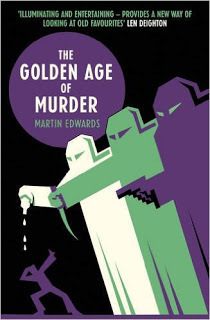 Let me start the year's blogging by wishing everyone who reads "Do You Write Under Your Own Name?" all the very best for 2017. Here's hoping it's happy and healthy for you, with lots of good books to read.
Let me start the year's blogging by wishing everyone who reads "Do You Write Under Your Own Name?" all the very best for 2017. Here's hoping it's happy and healthy for you, with lots of good books to read.For me, this is going to be a very busy twelve months, and I'll be explaining why in a few days' time. At this stage, though, I'd like to focus on what is in store for readers of this blog and my writing generally.
The paperback edition of The Golden Age of Murder comes out in February; this edition contains various revisions to the original version, and I'm eagerly looking forward to its appearance
The key brand new publication will be The Story of Classic Crime in 100 Books, which will appear under the imprint of the British Library (in the US it will be distributed by Poisoned Pen Press). I've worked on this for quite a long time, and it's benefited from the input of several experts, most notably Nigel Moss and Barry Pike. I must say I'm excited that it's now nearly ready to hit the presses. It's very different from The Golden Age of Murder, but I really enjoyed writing it, and I hope it will give crime fans plenty of entertainment. I don't yet have a precise publication date, but I'll keep you posted.
I'm also working on three more anthologies for the BL, while there will be plenty of intros to books in the Classic Crime series. I've also just written an intro for a book to be published by Harper Collins, and an extraordinary long lost classic for Locked Room International, as well as for a collection of locked room novels to be brought out by the Folio Society.
This year will also - I very much hope! - see the publication of Taking Detective Stories Seriously, a collection of the reviews of Dorothy L. Sayers with a lengthy commentary by myself. The Sayers Society are producing this book, and I'm looking forward to its appearance. The reviews are truly fascinating.
In terms of new fiction, I'm working on a couple of anthology, and stories of mine should be appearing also in a Malice Domestic antho, one published by Level Best in the US, and in EQMM (As well as -yes! - making some progress with the next novel....)
On the blog, the mixture will be much as before. I'll invite guest bloggers to talk about topics of interest from time to time, and review films and TV series, as well as talking about the craft of writing, and covering Forgotten Books most Fridays. As usual, posts will tend to appear on Monday, Wednesday and Friday of each week. But sometimes the pattern changes - usually because I press the wrong button and publish something prematurely. Times keep changing, but my techno-incompetence will - and this is the one forecast for 2017 on which you can confidently rely -, endure...
Published on January 02, 2017 03:07
December 31, 2016
2016 - Publications
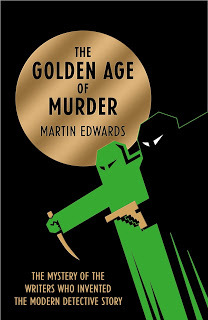 In 2016, I didn't publish a new novel, although The Dungeon House appeared in paperback, and earned very pleasing reviews. I'm afraid the same will be true in 2017 (though I am working on a new novel, promise!) Even so, this past twelve months proved to be the most wonderful of my entire writing career. And one of the main reasons is the success of The Golden Age of Murder, which outstrips anything else in my experience.
In 2016, I didn't publish a new novel, although The Dungeon House appeared in paperback, and earned very pleasing reviews. I'm afraid the same will be true in 2017 (though I am working on a new novel, promise!) Even so, this past twelve months proved to be the most wonderful of my entire writing career. And one of the main reasons is the success of The Golden Age of Murder, which outstrips anything else in my experience.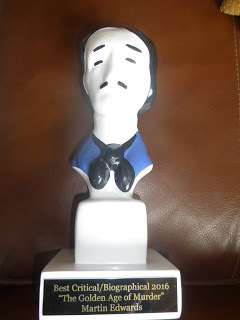 There was a dizzying 48 hour spell last April when I took the train from DC to New York, won the Edgar award for best non-fiction book on a fantastic evening, then returned just in time to take part in a panel at Malice Domestic celebrating the work of Patricia Moyes, before the gala dinner the next evening when the book won the Agatha. The company of great friends made the celebrations all the more special. Something I'll never forget.
There was a dizzying 48 hour spell last April when I took the train from DC to New York, won the Edgar award for best non-fiction book on a fantastic evening, then returned just in time to take part in a panel at Malice Domestic celebrating the work of Patricia Moyes, before the gala dinner the next evening when the book won the Agatha. The company of great friends made the celebrations all the more special. Something I'll never forget.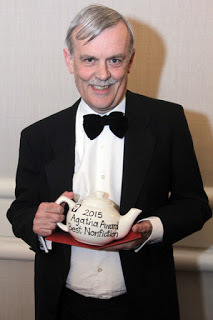 As if that were not enough, the next month the book won the H.R.F. Keating award at Crimefest; it was especially pleasing that the award was presented by Harry Keating's widow, Sheila. I'd had dinner with her and her agent the previous night, but they'd kept secret the judges' verdict, although they'd been told of it. Then at Bouchercon in New Orleans, Janet Rudolph presented me with the Macavity award, given to the book by Mystery Readers International. Given that the book was also shortlisted for the Anthony award and the CWA Gold Dagger for non-fiction, and that fellow authors on the shortlists included some renowned writers, not least Val McDermid, Frederick Forsyth and Adam Sisman, it was almost overwhelming. Memories to cherish. I'm also delighted to say that I've recently signed contracts to have the book translated into both Japanese and Chinese.
As if that were not enough, the next month the book won the H.R.F. Keating award at Crimefest; it was especially pleasing that the award was presented by Harry Keating's widow, Sheila. I'd had dinner with her and her agent the previous night, but they'd kept secret the judges' verdict, although they'd been told of it. Then at Bouchercon in New Orleans, Janet Rudolph presented me with the Macavity award, given to the book by Mystery Readers International. Given that the book was also shortlisted for the Anthony award and the CWA Gold Dagger for non-fiction, and that fellow authors on the shortlists included some renowned writers, not least Val McDermid, Frederick Forsyth and Adam Sisman, it was almost overwhelming. Memories to cherish. I'm also delighted to say that I've recently signed contracts to have the book translated into both Japanese and Chinese.
Another memory to treasure concerned the Detection Club's annual dinner at the Dorchester in November, the first over which I'd presided. We presented the US and UK editions of Motives for Murder, a collection of new stories that I'd edited in honour of Peter Lovesey's 80th birthday to the man himself. In the summer the Club had also published The Sinking Admiral, masterminded by Simon Brett, to which I'd contributed a chapter.
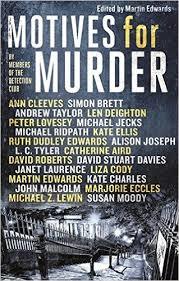
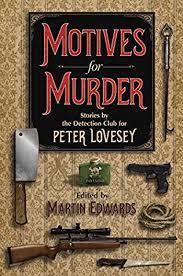
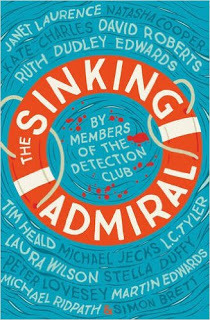 During the year, I've published occasional short stories, and I've written plenty of intros to books published by the British Library, Dean Street Press, and Harper Collins. The British Library published three anthologies that I've edited: Murder at the Manor, Serpents in Eden, and Crimson Snow, and they've all sold very well; far better than most of the anthos I've worked on over the years. I was especially gratified by reaction to my new solution to Anthony Berkeley's The Poisoned Chocolates Case, which was published in the autumn by the BL. And there are plenty more BL books to come in 2017. Including three more anthologies. So although I aim to have another novel out in 2018, there's plenty to keep me occupied between now and then....
During the year, I've published occasional short stories, and I've written plenty of intros to books published by the British Library, Dean Street Press, and Harper Collins. The British Library published three anthologies that I've edited: Murder at the Manor, Serpents in Eden, and Crimson Snow, and they've all sold very well; far better than most of the anthos I've worked on over the years. I was especially gratified by reaction to my new solution to Anthony Berkeley's The Poisoned Chocolates Case, which was published in the autumn by the BL. And there are plenty more BL books to come in 2017. Including three more anthologies. So although I aim to have another novel out in 2018, there's plenty to keep me occupied between now and then....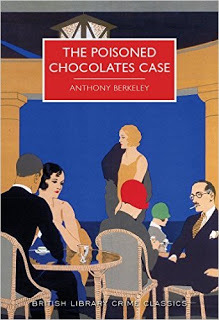
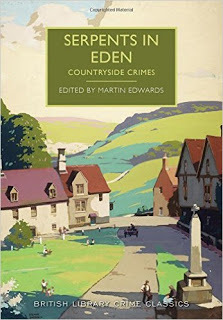 Finally, I wrote something else that didn't appear in print, but which has enjoyed a splendid short life within the British Library - the puzzle for customers of the Classic Crime pop-up shop, Murder at Magenta Manor. Attending the opening and seeing how imaginatively the design team had interpreted my material was fascinating, quite a unique occasion, as well as one more reminder of the reason for the endless appeal of crime fiction. The subject is deadly serious - but the genre is fun..
Finally, I wrote something else that didn't appear in print, but which has enjoyed a splendid short life within the British Library - the puzzle for customers of the Classic Crime pop-up shop, Murder at Magenta Manor. Attending the opening and seeing how imaginatively the design team had interpreted my material was fascinating, quite a unique occasion, as well as one more reminder of the reason for the endless appeal of crime fiction. The subject is deadly serious - but the genre is fun..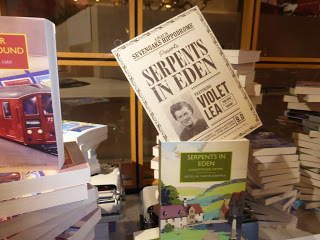
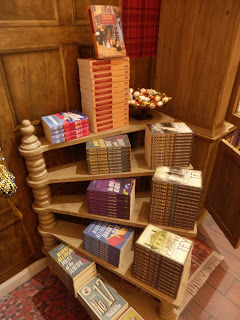
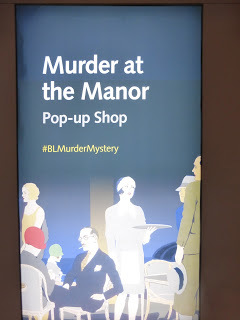
Published on December 31, 2016 04:15
December 30, 2016
2016 - People and Places
 Each year brings its ups and downs as well as many unforgettable moments. For me, 2016 has been a wonderful twelve months, but before reflecting on some of the lovely people I've spent time with, and some of the fantastic places I've visited, allow me to pause and remember some old friends who died this year, including fellow crime writers Stuart Pawson and Tim Heald. I've happy memories of both of them; not least driving around Arizona with Stuart and his wife Doreen (she took the above photo of Stuart and me) and spending a bizarre but convivial weekend with Tim at a book festival to which hardly anyone came.
Each year brings its ups and downs as well as many unforgettable moments. For me, 2016 has been a wonderful twelve months, but before reflecting on some of the lovely people I've spent time with, and some of the fantastic places I've visited, allow me to pause and remember some old friends who died this year, including fellow crime writers Stuart Pawson and Tim Heald. I've happy memories of both of them; not least driving around Arizona with Stuart and his wife Doreen (she took the above photo of Stuart and me) and spending a bizarre but convivial weekend with Tim at a book festival to which hardly anyone came.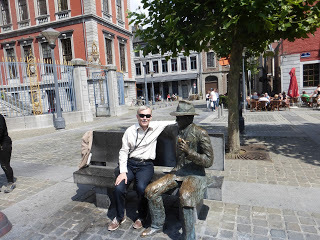 This year I've taken part in events to which quite a lot of people did come, in the company of a fascinating range of people - John Simenon, son of Georges, at the Essex Book Festival, for instance, and Kate Summerscale, Simon Brett and James Runcie at the London Library's 175th anniversary celebration, while Mark Lawson interviewed Ann Cleeves and me at the British Library. I've given talks at libraries in Cheshire and Nottinghamshire, as well as hosting a murder mystery evening in North Wales and giving an after-lunch talk to the Margery Allingham Society. The CWA's conference at Norwich was not only convivial; it gave me the chance to fulfil an ambition of taking a boat trip on the Norfolk Broads. Each event had its own character; each was pleasurable. And having met John, it was especially amusing to share a seat with a statue of his father when on the Simenon trail in Liege a few months later.
This year I've taken part in events to which quite a lot of people did come, in the company of a fascinating range of people - John Simenon, son of Georges, at the Essex Book Festival, for instance, and Kate Summerscale, Simon Brett and James Runcie at the London Library's 175th anniversary celebration, while Mark Lawson interviewed Ann Cleeves and me at the British Library. I've given talks at libraries in Cheshire and Nottinghamshire, as well as hosting a murder mystery evening in North Wales and giving an after-lunch talk to the Margery Allingham Society. The CWA's conference at Norwich was not only convivial; it gave me the chance to fulfil an ambition of taking a boat trip on the Norfolk Broads. Each event had its own character; each was pleasurable. And having met John, it was especially amusing to share a seat with a statue of his father when on the Simenon trail in Liege a few months later. Further afield, I've met up with old friends at Malice Domestic in Bethesda and at the New Orleans Bouchercon. And I've made a number of lovely new friends, including Shelly Dickson Carr, grand-daughter of the king of the locked room mystery, and Cathy Ace, born in Wales but resident in Canada, another writer of distinction. One of the most surreal moments of the year was joining up with Ali Karim and Mike Stotter on a flight from Atlanta and then taking a stretch limo from the airport to the Bouchercon hotel. Amazingly, it was cheaper than the regular transport. Only in New Orleans, I guess...
Further afield, I've met up with old friends at Malice Domestic in Bethesda and at the New Orleans Bouchercon. And I've made a number of lovely new friends, including Shelly Dickson Carr, grand-daughter of the king of the locked room mystery, and Cathy Ace, born in Wales but resident in Canada, another writer of distinction. One of the most surreal moments of the year was joining up with Ali Karim and Mike Stotter on a flight from Atlanta and then taking a stretch limo from the airport to the Bouchercon hotel. Amazingly, it was cheaper than the regular transport. Only in New Orleans, I guess...Through my involvement with the British Library, I've attended some terrific exhibitions and. I can strongly recommend the current exhibition on maps. A murder mystery weekend organised by Joy Swift in Stratford-on-Avon was great fun - Joy's events are also a must if you love interactive mysteries. As for seeing Burt Bacharach and Joss Stone on stage at the Royal Festival Hall in the summer, it was a special treat. So were a birthday trip on a steam train in Llangollen, and a climb up to the limestone pavement at the top of Malham Cove on a sunny day which ended with a Yorkshire supper at Betty's Tea Room in Ilkley, where I gave a talk about Gil North's Sergeant Cluff.

 Quite apart from conventions, I've done a lot of travelling, to places as varied as Antigua, Avignon, and Antwerp, Seville and St Thomas, Cordoba and Costa Rica, Brussels and Barbados, Stockholm and St Maarten, Panama and Puerto Rico. I've eaten in one of the late Stieg Larsson's favourite dining spots, been a guest of Janet Hutchings at Ellery Queen Mystery Magazine brunch in Bethesda, drinks party in New York, and dinner in New Orleands, as well as sharing a dinner table with Lee Child, Val McDermid and Andrew Taylor in Oxford. Nobody's lucky all the time, but I've certainly had a huge amount of good fortune this past year. Believe me, I'm grateful for it. .
Quite apart from conventions, I've done a lot of travelling, to places as varied as Antigua, Avignon, and Antwerp, Seville and St Thomas, Cordoba and Costa Rica, Brussels and Barbados, Stockholm and St Maarten, Panama and Puerto Rico. I've eaten in one of the late Stieg Larsson's favourite dining spots, been a guest of Janet Hutchings at Ellery Queen Mystery Magazine brunch in Bethesda, drinks party in New York, and dinner in New Orleands, as well as sharing a dinner table with Lee Child, Val McDermid and Andrew Taylor in Oxford. Nobody's lucky all the time, but I've certainly had a huge amount of good fortune this past year. Believe me, I'm grateful for it. .









Published on December 30, 2016 04:35
December 29, 2016
Jonathan Creek - Daemon's Roost - BBC TV review
[image error]
Jonathan Creek returned last night with a brand new 90 minute episode, Daemon's Roost. David Renwick created Creek (Alan Davies) twenty years ago, and deserves a huge amount of credit for reviving interest in the locked room/impossible crime mystery. He did so by updating the form, combining clever plots with sharp humour and winning performances from Davies and his original partner in crime, Maddy, superbly played by Caroline Quentin.
It's often said that the law of diminishing returns applies to humorous crime stories. Creek is no longer a fresh face on the screen, and Maddy is long gone; her successors have all been very good actors (in fact Sheridan Smith is one of my top favourites) but none have quite been able to capture the same spark with Davies. The same is true of Polly, his wife, played by Sarah Alexander. Polly is beautiful, and she and Jonathan are happy together; perhaps the problem is that it's a relationship with insufficient conflict, other than Polly's determination to declutter Jonathan's life, and make a break with his past.
Daemon's Roost paid tongue-in-cheek homage to the Hammer Horror movie, in its opening scene and the plot as a whole. I was amused to see a film poster which gave, as the name of the schlocky screenwriter, David Wickren - one of those little jokes with which Renwick, a quite brilliant writer of comedy, likes to adorn his stories. We had a creepy old mansion, a mysterious old legend in the Baskerville tradition, and a sub-plot featuring a rather unlikely homicidal maniac, bent on murdering Jonathan.
There were some very good moments in the story - many of them featuring Warwick Davis, who was terrific as the cheery local vicar. (But might he also be a killer?) The clues varied from the unlikely to the obvious, but the method of murdering a rich wife was ingeniously contrived; John Dickson Carr would, I suspect, have enjoyed it. Because Jonathan Creek is now so familiar, this show won't have made the same impression as the early episodes - how could it? - but it was enjoyable seasonal fare.
Jonathan Creek returned last night with a brand new 90 minute episode, Daemon's Roost. David Renwick created Creek (Alan Davies) twenty years ago, and deserves a huge amount of credit for reviving interest in the locked room/impossible crime mystery. He did so by updating the form, combining clever plots with sharp humour and winning performances from Davies and his original partner in crime, Maddy, superbly played by Caroline Quentin.
It's often said that the law of diminishing returns applies to humorous crime stories. Creek is no longer a fresh face on the screen, and Maddy is long gone; her successors have all been very good actors (in fact Sheridan Smith is one of my top favourites) but none have quite been able to capture the same spark with Davies. The same is true of Polly, his wife, played by Sarah Alexander. Polly is beautiful, and she and Jonathan are happy together; perhaps the problem is that it's a relationship with insufficient conflict, other than Polly's determination to declutter Jonathan's life, and make a break with his past.
Daemon's Roost paid tongue-in-cheek homage to the Hammer Horror movie, in its opening scene and the plot as a whole. I was amused to see a film poster which gave, as the name of the schlocky screenwriter, David Wickren - one of those little jokes with which Renwick, a quite brilliant writer of comedy, likes to adorn his stories. We had a creepy old mansion, a mysterious old legend in the Baskerville tradition, and a sub-plot featuring a rather unlikely homicidal maniac, bent on murdering Jonathan.
There were some very good moments in the story - many of them featuring Warwick Davis, who was terrific as the cheery local vicar. (But might he also be a killer?) The clues varied from the unlikely to the obvious, but the method of murdering a rich wife was ingeniously contrived; John Dickson Carr would, I suspect, have enjoyed it. Because Jonathan Creek is now so familiar, this show won't have made the same impression as the early episodes - how could it? - but it was enjoyable seasonal fare.
Published on December 29, 2016 04:24
December 28, 2016
Blind Date - 1959 film review
Blind Date (no, nothing to do with Cilla Black's TV show) is a film that was re-named Chance Encounter in the US. I'm not sure that either title is quite right, but Blind Date was the name Leigh Howard gave to the source novel, published in 1955. Four years later, Joseph Losey, a capable director, made the film.It's a murder mystery, but it also seems to aim to be something more.
The film begins rather oddly, with Hardy Kruger walking along a London street, clearly happy, and accompanied by a jaunty tune (the work of the young Richard Rodney Bennett, no less). He lets himself into a well-appointed flat, but whoever he hopes to meet isn't there. He finds some money in an envelope bearing his name, but then the police turn up. Gordon Jackson plays a stolid sergeant, soon pushed to one side by a Welsh inspector played by Stanley Baker and another inspector, this time a posh fellow whom the Welshman clearly doesn't care for.
Unfortunately for Kruger's character, the body of a woman is then found in the flat. He is reluctant to explain himself, but eventually his story comes out in a series of flashbacks. He's a struggling Dutch painter who was seduced by a French woman who is older, richer, and married. (She's played by Micheline Presle, a legend of French cinema, who is still going strong at the age of 84). He protests his innocence, but he is an obvious suspect.
There's quite a nice plot twist, but I felt the mystery element of the story was a bit thin. And gifted though Bennett was, I didn't feel that his score improved the film or even captured its mood. Losey devotes quite a lot of time to issues of the class divide in Britain, and this is interesting, though again laboured. There is, however, rich compensation in the presence of Baker, one of the most charismatic actors of his time. He died at the age of 48, weeks after it was announced he was to receive a knighthood in Harold Wilson's resignation honours list. Wilson was a friend of Baker's, but for me Baker deserved to be honoured. I'm not sure I've ever seen him give an indifferent performance, and at his best he was brilliant. Here, he makes an okay film something a little better than just okay.
The film begins rather oddly, with Hardy Kruger walking along a London street, clearly happy, and accompanied by a jaunty tune (the work of the young Richard Rodney Bennett, no less). He lets himself into a well-appointed flat, but whoever he hopes to meet isn't there. He finds some money in an envelope bearing his name, but then the police turn up. Gordon Jackson plays a stolid sergeant, soon pushed to one side by a Welsh inspector played by Stanley Baker and another inspector, this time a posh fellow whom the Welshman clearly doesn't care for.
Unfortunately for Kruger's character, the body of a woman is then found in the flat. He is reluctant to explain himself, but eventually his story comes out in a series of flashbacks. He's a struggling Dutch painter who was seduced by a French woman who is older, richer, and married. (She's played by Micheline Presle, a legend of French cinema, who is still going strong at the age of 84). He protests his innocence, but he is an obvious suspect.
There's quite a nice plot twist, but I felt the mystery element of the story was a bit thin. And gifted though Bennett was, I didn't feel that his score improved the film or even captured its mood. Losey devotes quite a lot of time to issues of the class divide in Britain, and this is interesting, though again laboured. There is, however, rich compensation in the presence of Baker, one of the most charismatic actors of his time. He died at the age of 48, weeks after it was announced he was to receive a knighthood in Harold Wilson's resignation honours list. Wilson was a friend of Baker's, but for me Baker deserved to be honoured. I'm not sure I've ever seen him give an indifferent performance, and at his best he was brilliant. Here, he makes an okay film something a little better than just okay.
Published on December 28, 2016 14:33



